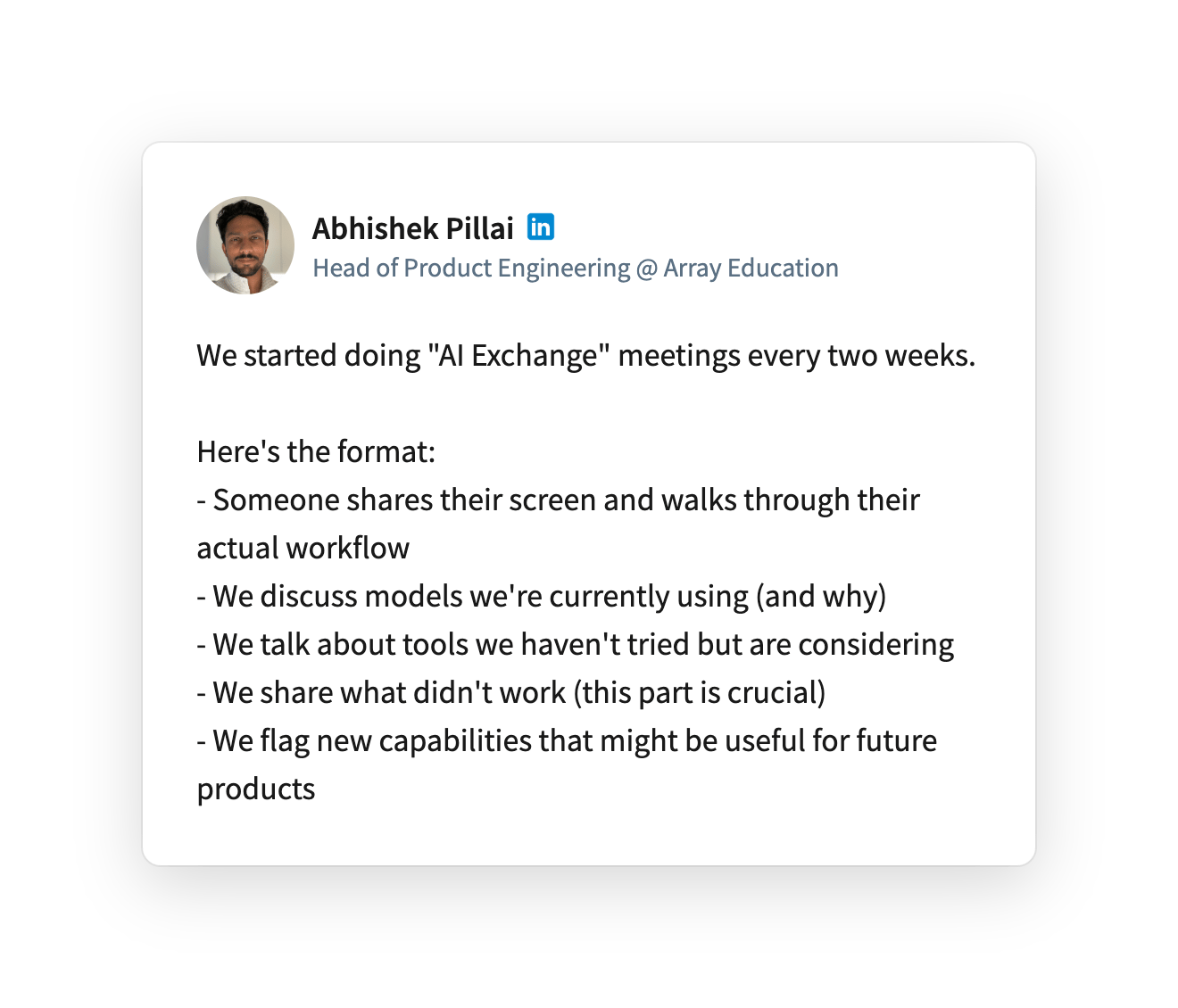- 100 School
- Posts
- 💯 Digest: AI isn't cutting jobs, it's changing how teams work
💯 Digest: AI isn't cutting jobs, it's changing how teams work
IBM fired 8000 people for AI (and rehired 8000 more). Here’s what that really means.
👋 Hey, it's Max
Last week, I spent hours inside a spreadsheet that tells stories.
It wasn’t revenue data or open rates. It was the final reflection form from the 30 Days of AI challenge we ran in September. Thousands of rows of raw thoughts from people who’d just spent a month building with AI.
Somewhere between the “this changed how I work” and the “I finally feel confident using AI”, one trend jumped out: people aren’t exactly scared of AI taking their jobs anymore but of not evolving fast enough inside them.
A few days after this realization, I came across this headline: 📰 IBM fired 8,000 workers for AI then rehired just as many.
Let me explain why that headline and that dataset tell the same story but before we dive in, I thought you might enjoy looking at this IBM datacenter from the 1960s as much as I did:
imagine if modern datacenters looked this beautiful
glass walls, street level, IBM in the 1960s was unmatched
— LaurieWired (@lauriewired)
5:34 AM • Oct 23, 2025
The AI rehiring loop
IBM’s CEO recently revealed that after automating thousands of roles, the company immediately began hiring again not to replace those people but to fill new roles that didn’t exist before. The new hiring was explicitly not to refill the automated jobs. Instead, they shifted the focus to roles requiring critical thinking and human interaction, such as:
Software Engineers (to build the AI itself)
Sales & Marketing (to sell and explain the new AI-powered services to clients).
Other high-value roles in areas like cybersecurity and cloud computing.
And they’re not the only ones figuring this out. Microsoft has quietly rebuilt whole departments this year trimming admin roles and retraining staff into what they now call “AI copilots.” Accenture’s doing the same on a massive scale, re-skilling over 800,000 employees. Their CEO, Julie Sweet, put it simply: some jobs won’t survive, but people will, if companies treat upskilling as continuous learning instead of a one-off project. Even PwC threw a billion dollars at retraining its consultants to use AI daily instead of hiring new ones.
So no, it’s not about layoffs anymore,
This is a realignment story and it’s exactly what participants in 100 School programs have been describing in their reflections:
“My biggest win wasn’t automating tasks. It was realizing I can now redesign how my job works.” - Participant, 30 Days of AI
“We started sharing mini-use-cases in Slack every week, and suddenly everyone wanted to learn. It became contagious.” - Team Lead, 30 Days of AI
This is a pattern I started noticing especially with regular professionals realizing they don’t need to wait for permission to evolve their workflow.
What the data (and IBM) are really saying
The uncomfortable truth is AI doesn’t shrink teams but reshapes what teams are for. In our own assessments (data from teams training), we saw the same thing IBM’s seeing at scale:
Stage 1: Panic (everyone fears layoffs)
Stage 2: Play (a few people start testing it out)
Stage 3: Redesign (people reimagine how their roles actually work)
I think many teams will be living through this redefinition of roles over the next year.
Window into the Future 🔮
We’re entering an era where being “AI-literate” will matter more than being “AI-trained.”
The numbers below make it pretty clear. The real advantage is knowing how to work with AI tools when everything about your job keeps changing. Companies that retrain from within will move faster than those that panic-hire from outside.
As McKinsey’s 2025 Tech Trends report put it:
92% of executives plan to invest more in AI. Only 1% say their teams are actually good at using it.
It’s why 100 School for Teams is doubling down on helping teams build AI champions internally who can translate tools into outcomes and close that 91% gap. And it’s why our next 30 Days of AI challenge (starting Nov 3) is designed around helping professionals become the person their team turns to when AI comes up, not the one who gets replaced when it does.
Host your first 15-minute AI Exchange this week
This post nails what great teams are doing right now 👇
Start simple: Pick a 15-minute slot this week and invite your team to bring one AI use case they’ve tried, good or bad, doesn’t matter. You’ll be shocked how fast confidence and curiosity spread when people stop whispering about AI and start comparing notes out loud.
And if you want to give your team a structure for this, book your Free AI audit. AI is rewriting teamwork. The sooner you learn to write together, the faster you’ll move.
Before You Go…
Keep building. Keep shipping. Keep it 💯
Cheers!
Max 👋
P.S. Want to make your team & company AI-first? Let us help here.


